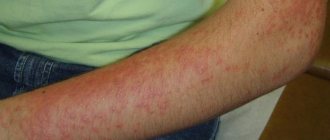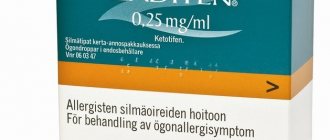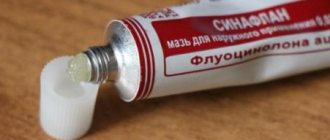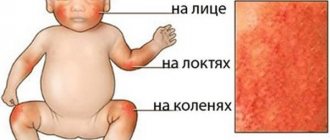Pharmacological action of Cetrin
Cetrin is a histamine antagonist that blocks H1 histamine receptors . The active ingredient is cetirizine. Cetrin is indicated as a prophylactic against allergic reactions, as well as to facilitate their occurrence. It has an antipruritic and antiexudative effect. Affects allergic reactions at an early stage. At the stage of an allergic reaction, the drug limits the release of inflammatory mediators. Cetrin prevents tissue swelling, relieves smooth muscle spasms, and reduces capillary permeability. Eliminates skin reactions to specific allergens. Does not have antiserotonin and anticholinergic effects. Subject to therapeutic doses, it has virtually no sedative effect. After a single dose of the drug, the onset of effect, in approximately half of the patients, is observed after 20 minutes, after 1 hour in 95% of patients. The effect of the drug lasts more than 24 hours. During therapeutic treatment, tolerance to the antihistamine effect of the drug does not develop. After completion of treatment, the effect of the drug lasts up to 3 days.
Cetrin during lactation
When allergy symptoms occur, women begin to look for an answer to the question of whether a nursing mother can take Cetrin. According to doctors, the drug should not be taken during breastfeeding. This is explained by the fact that a large amount of the active substance passes into breast milk and negatively affects the newborn’s body. For this reason, Cetrin should not be taken during lactation.
But if a lactating woman nevertheless decides to take an antihistamine, then she must do it correctly. To reduce the negative impact of cetirizine on the baby’s body, the medication is taken after feeding. Then the concentration of the active substance in milk will be minimal. Do not forget that you need to eat before taking the medicine.
Thus, Cetrin is an effective antihistamine that is not recommended for use during breastfeeding.
To eliminate allergy symptoms, it is recommended to use safer drugs of the latest generation (Levocetirizine, Desloratadine, Sehifenadine, etc.), prescribed by an allergist. If side effects occur in the mother or child, discontinue the medication and consult a doctor. Subscribe to our VKontakte group
Cetrin dosage and instructions for use
Cetrin is taken orally, washed down with water in tablet form, and dissolved in water in the form of drops.
Dosage for children over 6 years of age and adults – 10 mg of the drug once a day, or 5 mg twice a day. Children from 2 to 6 years old, half the adult dose. Children from one to two years old, 2.5 mg (5 drops) 2 times a day. For patients with reduced renal function, 5 mg once daily. For severe forms of chronic renal failure, Cetrin is indicated at a dose of 5 mg once every 48 hours.
Cetrin - contraindications you need to know
Cetrin is a latest generation antihistamine drug that has very few contraindications and side effects.
However, side effects, although rare, do occur, and patients who take Cetrin should be aware of them and take them into account. Why does Cetrin have few side effects?
Cetrin is a selective blocker of histamine H1 receptors, which in turn causes all manifestations of allergic reactions. Medicines in this group relieve all manifestations of allergic reactions well, but the drugs of previous generations did not have a high degree of selectivity, and their action often extended to the receptors of other mediators - this caused side effects.
Another reason for the reduction in side effects is that manufacturers have achieved the literally impossible: at the recommended dose, citrine does not cross the blood-brain barrier and does not enter the central nervous system. This ensured the almost complete absence of such a symptom as drowsiness, which is characteristic of previous generations of drugs of this group. Sometimes drowsiness does occur, but this happens very rarely, whereas representatives of previous generations of antihistamines diphenhydramine and suprastin were often perceived as hypnotics.
Cetrin is taken orally in tablet form, regardless of meals. It does not irritate the mucous membrane of the gastrointestinal tract (sometimes such manifestations occur, but very rarely) and is perfectly absorbed into the blood, even if there is undigested food in the gastrointestinal tract. Subsequently, it enters the tissues, and after a day the main part is excreted unchanged through the kidneys, and a smaller part is decomposed in the liver and excreted in urine and feces. The elimination process is the “weak link” of cetrin, since if kidney function is impaired, this will lead to the accumulation of the drug in the blood and then some other side effects may well appear, for example, sedative and hypnotic.
Side effects
Cetrin has very few side effects. So, in some patients it can still cross the blood-brain barrier and cause drowsiness - it all depends on the individual characteristics of the body. In addition to drowsiness, patients may experience headaches, dizziness, dizziness - if the ground disappears from under their feet, weakness. But instead of weakness and drowsiness, in some cases motor and mental agitation develops.
Sometimes side effects from the gastrointestinal tract develop. These are dry mouth, nausea, vomiting, diarrhea and other signs of digestive disorders.
As with any other drug, it is quite possible to develop allergic reactions to cetrin. They most often appear in the form of an itchy skin rash, including the development of urticaria and angioedema. Prevention and treatment of edema - it is important to understand the root cause (Quincke's edema), the danger of which is that it can spread to the vocal cords, causing their swelling and suffocation .
Who should not use Cetrin?
Cetrin is an over-the-counter drug that you can have in your home medicine cabinet, so patients who take it themselves should clearly know in what cases this drug is contraindicated.
First of all, cetrin is contraindicated during pregnancy - it is believed that drugs in this group can have a negative effect on the fetus. It is also contraindicated to take cetrin when feeding a child. Breastfeeding is a personal choice - breastfeeding - it is excreted in the mother's milk. It should not be used by children under six years of age.
The main reason for all of these contraindications is the lack of adequate clinical trials that meet international requirements on pregnant women, nursing mothers and children under six years of age. Therefore, no one can say with certainty what effect cetrin has on them.
Another absolute contraindication for taking cetrin is the patient’s increased sensitivity to the components of the drug. No matter how mild the form it appears, you cannot take risks: the next time you take a Cetrin tablet, the reaction can be very severe and may even require resuscitation.
Cetrin is used with caution in severe kidney diseases, which are accompanied by chronic renal failure. Chronic renal failure - what to do and what to do? In this case, patients are advised not to take the drug on their own, but to seek help from a doctor. If there really are vital indications for taking cetrin, the doctor may prescribe this drug in half the dose, dividing it into two doses.
Indications and contraindications for taking cetrin are clearly described in the instructions, and if a patient takes the medicine without a doctor’s prescription, he should read these instructions.
Galina Romanenko
Article tags:
- cetrin
|
|
Articles on the topic How to take Cetrin - all indications and rules of administration
Cetrin and alcohol - cannot be combined
Cetrin and pregnancy: concepts are incompatible
Cetrin – relieves allergies
Release form and composition of the drug
The drug is produced by the large Indian pharmaceutical company Dr. Reddy's Laboratories. It produces the drug in several forms.
Among them the most popular are:
- pills;
- syrup;
- drops.
In Russian pharmacies, Cetrin is most common in tablet form. Their popularity is explained by the fact that the medicine in this form is as convenient as possible to use. The tablets are tasteless and require only a small amount of clean water to take. In addition, the medicine is convenient to take with you.
1 tablet contains no more than 10 mg of the active substance, which is cetirizine in the form of dihydrochloride. The white film coating covering the products consists mainly of macrogol 6000, sorbic acid and talc.
The syrup is a viscous solution with a sweetish, pleasant taste and fruity smell. Unlike tablets, this dosage form has a lower concentration of the active substance (no more than 1 mg per 1 ml), which allows it to be used for children over 2 years old.
The production of syrup is also carried out with the participation of additional substances:
- sucrose;
- glycerol;
- sorbitol.

Cetrin in the form of drops is considered the safest form of the drug, since it is prescribed in small doses to children from 6 months of age. The active substance content in 1 ml of solution is 10 mg. Additionally, components such as glycerol, sucralose, and propylene glycol are used.
Despite the differences in the concentration of cetirizine dihydrochloride, any of the possible dosage forms is not recommended for use in hepatitis B. Before purchasing the product, consultation with a specialist is necessary.
Pharmacodynamics and pharmacokinetics
The drug is especially effective in the initial stages of the development of an allergic reaction. It prevents its further development by limiting the activity of histamine receptors.
When used in later, more severe stages, cetirizine helps reduce the rate of release of mediators and prevents the spread of inflammatory processes. At the same time, the main substance acts on blood vessels, reducing their permeability, and fights spasm of smooth muscles.
The active activity of the component begins from the moment of its penetration into the organs of the gastrointestinal tract. Here, cetirizine is absorbed into the blood, where it reaches its maximum concentration within an hour after administration. Once in the liver, the component goes through a series of metabolic processes.
Half of the total amount of the active substance taken with the tablet is excreted from the body after 10 hours. Most of it is excreted unchanged in the urine. Up to 10% of cetirizine is found in feces. The components of the drug are also excreted in breast milk in a volume of 25 to 90% of the total volume of the drug.
Manifestations and symptoms of allergies in children:
- Diathesis, atopic dermatitis. Accompanied by rashes.
- Hay fever. When pollen gets on the nasal mucosa, inflammation begins. The child sneezes, has difficulty breathing, and has nasal discharge.
- Allergic conjunctivitis. There is swelling of the eyelids and profuse lacrimation. Itching, photophobia, and a feeling of “sand” in the eyes may occur.
- Hives. Accompanies food and contact allergies. Skin rashes resemble mosquito bites or a nettle sting.
- Bronchial asthma is a particularly severe manifestation of allergies. Epidemiological studies in recent years confirm the high prevalence of asthma among children. It becomes difficult for the child to breathe, whistling and wheezing are heard, a debilitating cough appears, and attacks of suffocation are typical. The child gets tired quickly and has difficulty concentrating, complaining of drowsiness[4].
In a single manifestation, most symptoms do not pose a strong threat (with the exception of asthma attacks, Quincke's edema). It is enough to take the appropriate medicine. But it is necessary to take into account that reactions will appear constantly. General health may worsen each time. Over time, a negative reaction to the drug used in treatment occurs.
Allergies must be treated, but not every medicine is suitable for a child.
Cetrin - overdose:
A symptom of overdose in case of intentional or unintentional excess of the dosage is drowsiness. Tremors, increased heart rate, urticaria, urinary retention, and itching are also possible. During treatment, the functions of the cardiovascular and respiratory systems are examined. After taking a high dosage of Cetrin, induce vomiting, perform gastric lavage, and prescribe enterosorbents and laxatives. In case of severe symptoms from the cardiovascular and respiratory systems, treatment is symptomatic. There is no specific antidote.
Pharmacological properties
Cetrin is used during breastfeeding to relieve signs of an allergic reaction. Its effect on the body is based on the properties of the active substance - cetirizine dihydrochloride.
The occurrence of an allergic reaction is associated with the active production of histamine. A certain amount of it is constantly present in the human body, but upon contact with an allergen it grows rapidly. It is histamine that is responsible for the dilation of blood vessels. The substance increases the permeability of their walls and also provokes the appearance of edema.
Cetirizine is a histamine antagonist. Once in the body, it slows down the production of the mediator of the allergic reaction by blocking H1 receptors located in the endothelium, smooth muscle tissue and organs of the central nervous system.
Thanks to this, taking the drug helps prevent:
- itching;
- swelling;
- lacrimation and other unpleasant symptoms.
Can Cetrin® be taken by children?
To treat allergies, you need an integrated approach, the basis of which is drug therapy and, as a rule, an antihistamine is always part of it. To select the right treatment, a special examination and a number of tests are usually carried out:
- Physical examination. It involves a thorough external examination of the child, identification of an allergic disease, and checking the condition of internal organs by palpation.
- A specific allergy examination involves passing provocative tests, analyzing a food diary, taking an anamnesis, as well as performing skin tests and laboratory examination methods.
- Laboratory methods (biochemical blood test, urine test, peripheral blood test, washings from the nasal cavity and conjunctiva of the eye, smears and cytological examination of secretions, sputum analysis, blood gas analysis, parasitological examination, etc.).
- Instrumental examination (bronchoscopy, rhinometry and anterior rhinoscopy).
A functional test or respiratory function test is carried out if bronchial asthma is suspected and bronchomotor tests are performed [5].
Cetrin® in the form of tablets can be used in children over 6 years of age, 5 mg (1/2 tablet) 2 times a day or 10 mg (1 tablet) 1 time a day. The drug is available in pharmacies without a doctor's prescription and is recommended for your home medicine cabinet in case you need to get rid of allergy symptoms.
How does Cetrin work and its composition?
So, once Cetrin enters the body, it acts quite quickly; the effect begins to develop within 20–25 minutes:
- Eliminates itching, reduces redness and skin rashes.
- Eliminates swelling and prevents its further development.
- It has an antispasmodic effect on smooth muscles.
- Antiexudative effect: Cetrin reduces the permeability of capillary walls and thus prevents the release of fluid from the bloodstream into the tissue.
- Due to a pronounced decrease in the rate of migration of eosinophils into the allergic focus, Cetrin significantly reduces the severity of late phenomena of hypersensitivity reactions.
- It has a generalized anti-inflammatory effect, since it inhibits the synthesis and release of cytokines (substances that are mediators of the inflammatory process).
The half-life of cetirizine from the child's body is six hours; in adults this figure increases to seven to ten hours. The active ingredient of the drug "cetrin" is cetirizine . Cetrin tablets contain ten milligrams of the active substance.
Auxiliary components:
- milk sugar;
- corn starch;
- povidone;
- magnesium stearate.
Syrup - 1 milligram in one milliliter. This dosage is needed when a child needs to be given a small dose of cetirizine. Cetrin syrup contains a number of components as excipients.
Cetrin - what it helps with, indications for use
- Runny nose - seasonal and year-round. Cetrin reduces swelling of the nasal mucosa and makes breathing easier.
- Allergic conjunctivitis.
- Hay fever.
- Urticaria of various origins.
- Skin lesions accompanied by severe itching (such as atopic dermatitis, neurodermatosis).
- Skin itching of any origin, with the exception of cholestatic.
- Eczema.
- Bronchial asthma.
- Swelling of the mucous membrane of the respiratory tract in respiratory diseases.
- Prevention of the so-called atopic march, when the symptoms of dermatitis spread to the mucous membrane of the respiratory system.
- Quincke's edema.
Contraindications for use
- For Cetrin tablets: age less than six years.
- For Cetrin syrup, the age is less than two years.
- Any type of hypersensitivity to cetirizine or excipients.
- Pregnancy.
- Breast-feeding.
- A relative contraindication is renal failure.
Cetrin - additionally:
No dosage adjustment is required in patients with impaired hepatic function unless concurrent impairment of renal function is observed.
In case of renal failure, the dose is reduced to ½ tablet per day (5 mg). Not recommended to be taken with alcohol. Persons who operate complex machinery and vehicles should take with caution. Important! Before using Cetrin, you should consult your doctor. This instruction is intended for informational purposes only.










